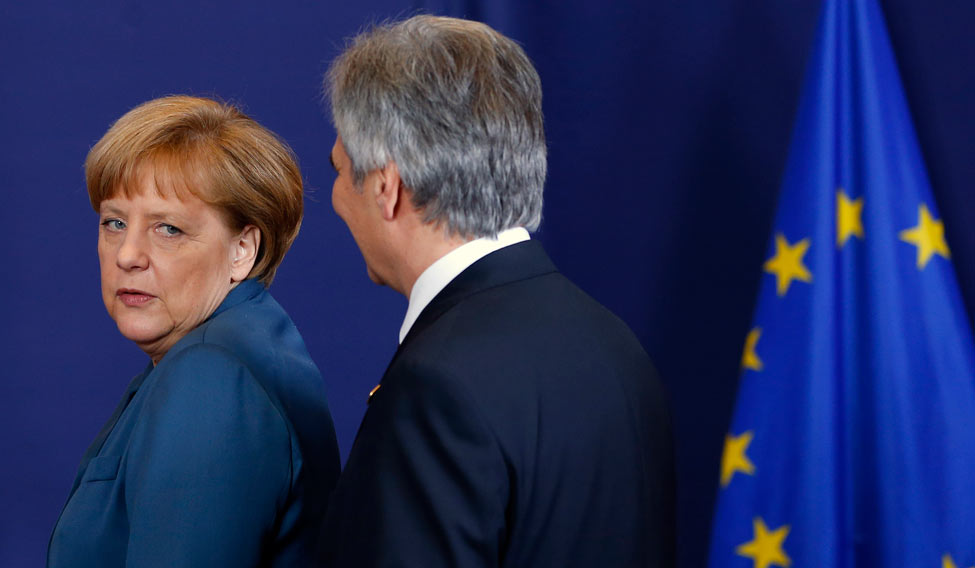In September, the leaders of Austria and Germany took one of the most pivotal decisions of Europe's refugee crisis, throwing open their borders to tens of thousands of migrants piling up in Hungary.
The move by German conservative Angela Merkel and Austria's Werner Faymann, a Social Democrat, was an act of common purpose: two neighbours which share a difficult history were working together to prevent a humanitarian catastrophe.
Nearly half a year on, however, the display of unity over the September 5-6 weekend is a distant memory. In a sign of how deep Europe's divisions over refugees have become, Berlin and Vienna snipe at each other almost daily.
This week the tensions reached a new peak as Austria, in a defiant move, hosted a conference to coordinate new border restrictions with a handful of Balkan countries to its southeast.
It was the latest in a series of decisions by Vienna—including two awkwardly timed announcements of numerical caps on refugees entering the country—that have undermined Merkel and infuriated her allies in Berlin, who accuse their smaller neighbour of betrayal.
German Interior Minister Thomas de Maiziere ominously warned Vienna this week of "consequences". Austria says it is simply overwhelmed by the influx of migrants and was forced to act.
Domestic political factors have played a decisive role in Vienna's break from Berlin, with Faymann facing severe pressure from his coalition partner, the centre-right People's Party, to take a hard line.
Both ruling parties have been spooked by the rise of the far-right Freedom Party, led by anti-immigrant nationalist Heinz-Christian Strache.
Polls now put the Freedom Party in first place nationally, underlining how much support parties in the national government have lost and how the mood towards refugees has shifted since an initial outpouring of sympathy last September.
In a series of provincial elections last year in which migration was the dominant issue, the Freedom Party made large gains while the Social Democrats and the People's Party lost ground, including in traditionally left-wing Vienna in October.
"At the origin of all this is the pressure that exists inside the country, primarily from the Freedom Party," said political analyst Thomas Hofer.
Praise for Hungary
Austria is one of the wealthiest countries in the European Union per capita, but unemployment has been rising steadily and voters' economic concerns have grown.
Strache has praised Hungary for fencing off its southern border to keep migrants out and called for Austria to take similar measures.
Standing up to Germany appeals to some Austrians who see their far bigger neighbour as a sometimes overbearing one.
Austria infuriated European Union peers at a Brussels summit last week by insisting on capping the number of migrants it takes in, undermining Merkel's push to seek a joint EU solution to the bloc's refugee crisis in tandem with Turkey.
The measures included a daily limit of 3,200 migrants, many of whom would be allowed to travel on to Germany, and of 80 new asylum claims. The move was part of a coordinated effort with Slovenia, Croatia, Macedonia and Serbia that has left thousands of migrants stuck in Greece.
Ironically, one key factor behind Austria's tighter border restrictions has been its fear that Germany might introduce its own tighter controls first, causing a build-up of migrants in Austria much like the one Greece is experiencing.
Merkel's conservative allies in Bavaria, the southern state that borders Austria, have been calling for tighter border restrictions for months.
They want a formal cap on the migrants Germany lets in, and have even threatened Merkel with legal action, but she has rebuffed them, arguing that border closures and caps would have devastating consequences for Europe.
The German debate has tested nerves in Vienna. Reports about migrants being sent back to Austria by German border police have stoked public concern further.
"There is no wave of protests but the pressure (from the public) is very palpable," one Austrian official said on condition of anonymity.
Regardless of Austria's reasons, and despite the fact that the new controls may ultimately relieve domestic pressure on Merkel by stemming the number of incoming migrants, there has been little understanding in Germany.
People close to Merkel describe Austria's measures as "illegal", and this week top-selling German tabloid Bild carried the headline: "Vienna forges anti-Merkel pact with the Balkans.
"The Munich-based Sueddeutsche Zeitung described Austria's latest measures as "unscrupulous" acts that would lead to the collapse of Europe.





